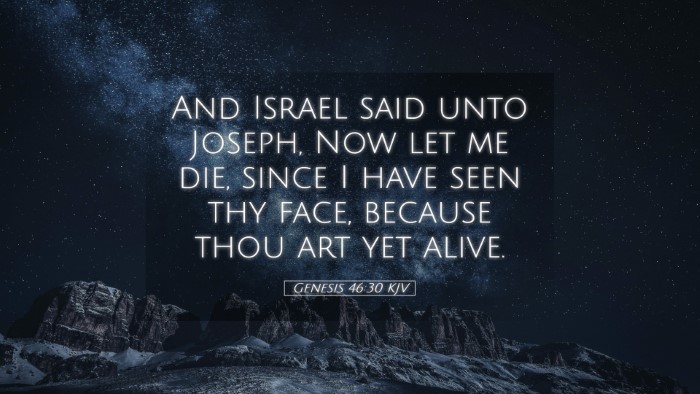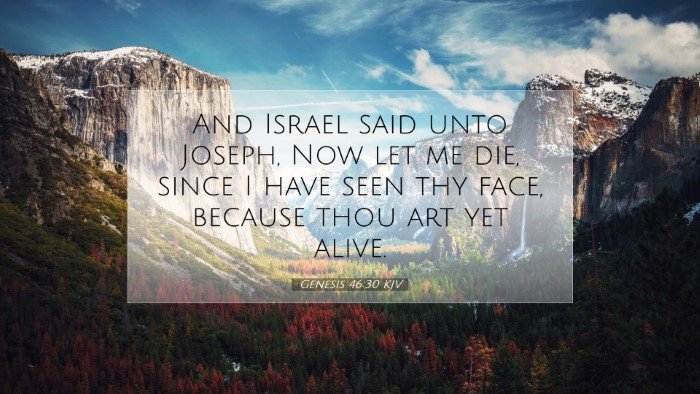Commentary on Genesis 46:30
Genesis 46:30 states: "And Israel said unto Joseph, Now let me die, since I have seen thy face, because thou art yet alive." This profound verse captures the poignant reunion between Jacob (now named Israel) and his son Joseph, after years of separation and presumed loss. The emotions and theological implications embedded in this moment warrant detailed exploration.
Contextual Background
To fully grasp the significance of this verse, it is essential to consider the broader context of Genesis 46. The chapter describes Jacob's journey to Egypt in response to Joseph's invitation during a time of famine. This pilgrimage represents not only a physical relocation but also a pivotal moment in the larger narrative of God's unfolding plan for His people.
Theological Insights
- The Significance of Seeing: Jacob's statement, "Now let me die," underscores the deep emotional relief and fulfillment he experiences upon seeing Joseph alive. From a theological perspective, this reflects the human yearning for connection and reassurance, which finds its ultimate fulfillment in Christ, the ultimate revelation of God to humanity.
- Sovereignty of God: Joseph's survival and rise to power in Egypt demonstrate God's sovereignty over all circumstances. Jacob’s belief that he could rest in peace upon seeing Joseph echoes the principle that God’s plans can synchronize our lives with His divine purposes, even through suffering and trials.
- The Mantle of Heritage: Israel's actions signify the continuation of God's covenant with Abraham, Isaac, and Jacob, showcasing the importance of familial relationships in God’s redemptive history. The reunion thus acts as a reaffirmation of God's promises and the enduring legacy of faith and survival of the patriarchal family.
Commentary Perspectives
Matthew Henry: Henry highlights the emotional gravity of Jacob's declaration, presenting it as a moment of closure and peace for a father who had endured great sorrow. He notes that Jacob's life, once fraught with doubt and despair, finds renewed meaning in seeing his son alive, illustrating the power of faith and the beauty of familial love.
Albert Barnes: Barnes delves into the implications of Jacob's statement concerning ‘death and satisfaction.’ He observes that seeing Joseph provided Jacob with a kind of peace—the resolution of all turmoil he had faced. This encounter serves as a metaphor for spiritual fulfillment; just as Jacob found peace in Joseph’s presence, believers find solace and purpose in their relationship with God through Christ.
Adam Clarke: Clarke emphasizes Jacob's acknowledgment of Joseph's significant role within God's providential plan. Jacob’s declaration also points toward the relational dynamics central to the narrative, accentuating themes of reconciliation and the restoration of lost relationships, crucial to the unfolding of God’s redemption story.
Application for Modern Believers
This rich narrative encourages modern believers to consider several applications:
- Hope in Reunion: Just as Jacob found hope in reunion with Joseph, believers are reminded of the ultimate hope we have in Christ—a future reunion with Him and with loved ones.
- Trust in Divine Timing: The journey Jacob undertook illustrates the importance of trusting God's timing in personal and family matters. God invites us to believe that, regardless of the challenges we face, His plan is for our ultimate good.
- Communal Legacy of Faith: The passage encourages us to recognize and cultivate our family lineage of faith, ensuring that the truths of the Gospel are passed on from generation to generation.
Conclusion
In Genesis 46:30, Jacob's emotional outburst places a spotlight on the profound themes of reunion, faith, and God's sovereignty. As scholars and theologians reflect on this brief yet powerful statement, they uncover the layers of meaning that continue to resonate deeply within the fabric of the Christian faith. The verse calls believers to recognize moments of divine intervention in their lives and to celebrate the hope and reconnections that God promises to bring.


